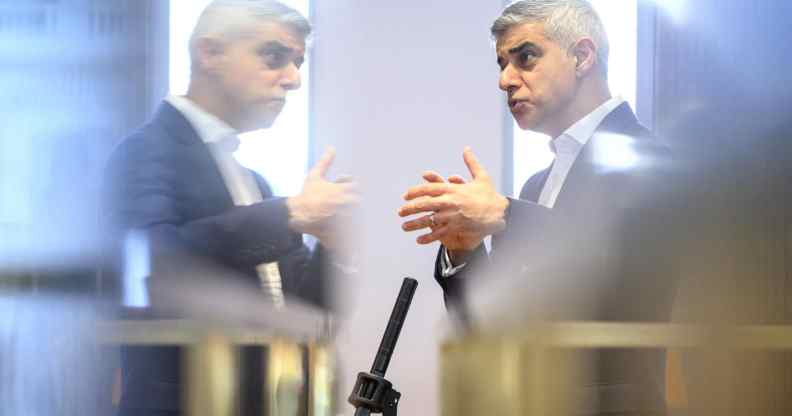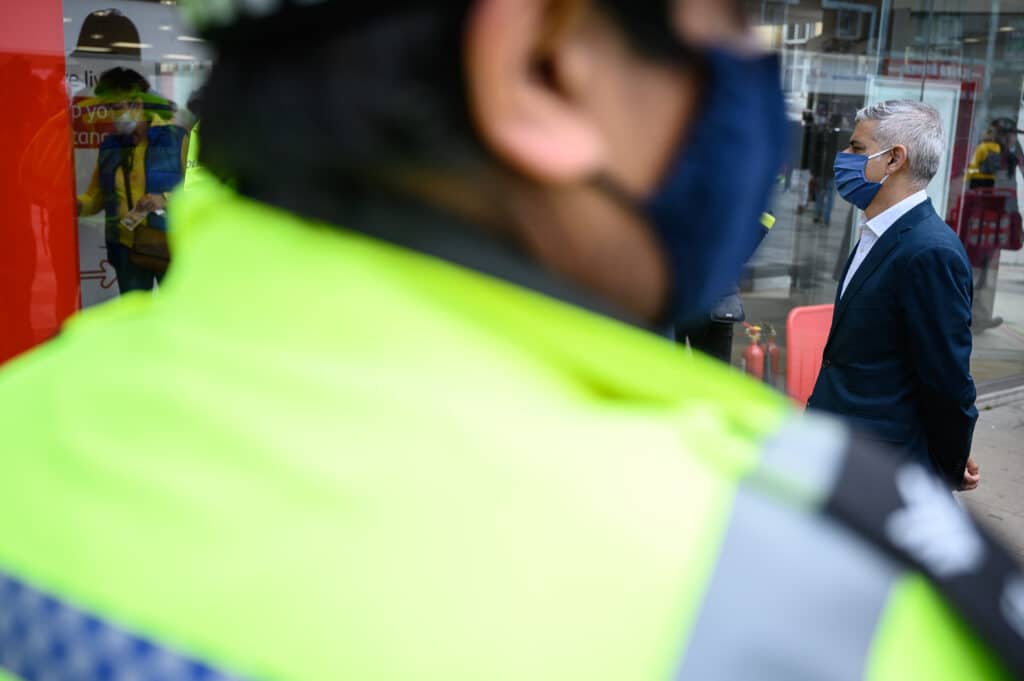Sadiq Khan unveils plan to fix broken Met Police and ‘confront’ police racism and homophobia

Mayor of London Sadiq Khan. (Leon Neal/Getty Images)
Mayor of London Sadiq Khan has published his plan to rebuild trust in the city’s disgraced Metropolitan Police.
With half of Londoners disproving of the Met, Khan unveiled on Thursday (24 March) his four-point Police & Crime Plan to improve trust, cut crime and drive “out the racism, homophobia, transphobia, bullying and misogyny which still exists” within the Met’s ranks.
Following consultation with nearly 4,000 Londoners, including victims of crimes, community groups and businesses, Khan said his “number one priority” is to make the capital city safer.
The four areas of improvement identified by the mayor’s office are: reducing and preventing violent crime; increasing public trust; improving victim support and protecting young people from exploitation and harm. A priority in light of Sarah Everard’s death will be to end violence against women and girls, he added.
“We appreciate that public trust has been affected by a series of deeply concerning incidents that have called into question the culture and standards of the MPS,” Khan said in a statement.
“When trust is eroded, it makes it harder to tackle crime, with victims failing to report crime and witnesses discouraged from coming forward when they see criminals.”
Sadiq Khan vows to ‘confront’ claims of homophobia and racism within Met ranks
Years of deep mistrust of London’s police force have come to a head in recent years, particularly following the murder of Sarah Everard at the hands of a serving Met officer.
The Met has long had a reputation for racism and other prejudices. In February, the Independent Office for Police Conduct (IOPC) published a damning report which found evidence of Met police officers engaging in deeply racist, xenophobic, homophobic and misogynistic discrimination and harassment.
The resulting backlash forced Met chief Cressida Dick to resign.
Just this week, a leaked IOPC report suggested that Met police officers made assumptions about “the lifestyles of gay men” in investigating murders committed by Stephen Port.
Inquests into Port’s crimes heard that officers were guilty of “institutional homphobia”. Though jurors were asked not to consider whether such prejudices played a part in his victim’s deaths, it was found that police errors “probably” contributed.
Khan said in his plan that such issues “must be confronted and addressed, not only for the benefit of Londoners but also for the tens of thousands of dedicated, caring and professional officers and staff who have been badly let down by the appalling behaviour and misconduct of others.”
Among Khan’s plans to rebuild trust, the Met’s disciplinary process will face increased scrutiny while community-led training for officers will be developed.
Khan’s plan noted that trust of police is lower among LGBT+, Black and mixed-race communities – 50 per cent of Black Londoners, 47 per cent of mixed-race Londoners and 52 per cent of LGBT+ Londoners feel they are treated fairly, compared to an average of 64 per cent.
The mayor’s office wants to fix this including by addressing “concerns about the disproportionality in the use of certain police powers affecting Black Londoners”.

London Mayor Sadiq Khan (R) speaks to police officers as he walks through Ilford shopping precinct. (Leon Neal/Getty Images)
Not only is one of Khan’s key aims to reduce violent crime, but the mayor also said that the force must address “underlying causes” by adopting a “public health approach”.
Claire Waxman, London’s Independent Victim Commissioner, welcomed the plan, which she said “rightly prioritises the rights and needs of victims”.
“I am also pleased to see clear acknowledgement that public trust and confidence have been damaged and urgently need to be rebuilt,” Waxman added.
“It is crucial for the individual wellbeing and protection of victims and for wider public safety that victims feel able to come forward to report and the Mayor’s new Police & Crime Plan will help us achieve this in London.”
Public trust in the force has sunk to new lows in recent months. The Met’s response to the string of lockdown-busting parties held in Downing Street further eroded trust, with more than half of Brits barely confident in the Met’s investigation, a February Ipsos poll found.
For Black Britons, trust in the Met plummeted by five per cent from 2020 to 2021, falling to just 37 per cent according to YouGov.
According to government figures, nine out of 10 victims of anti-LGBT+ hate crimes do not report the incident to the authorities.

